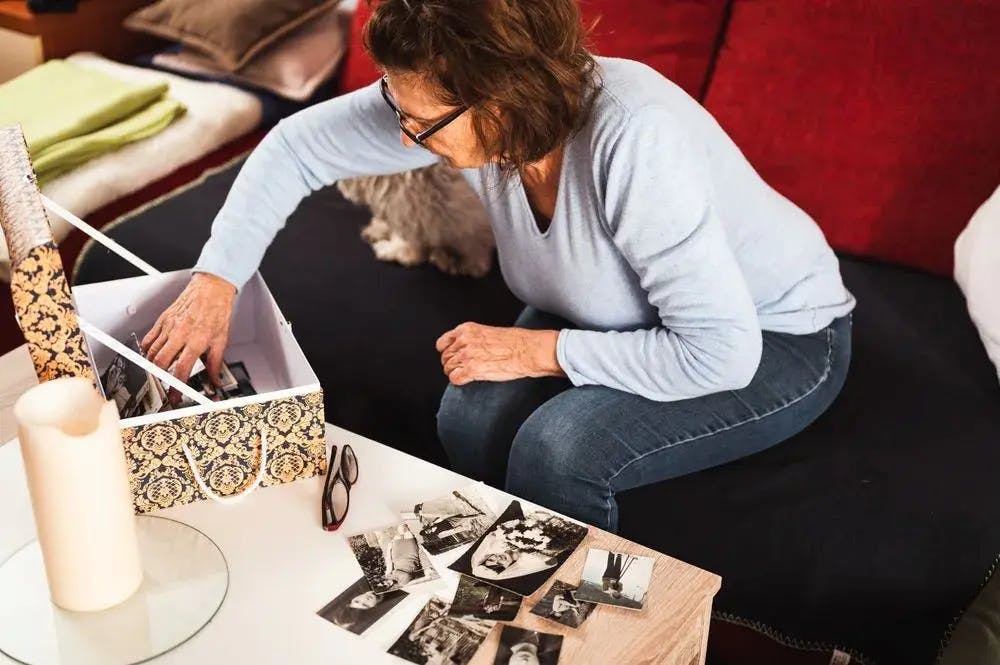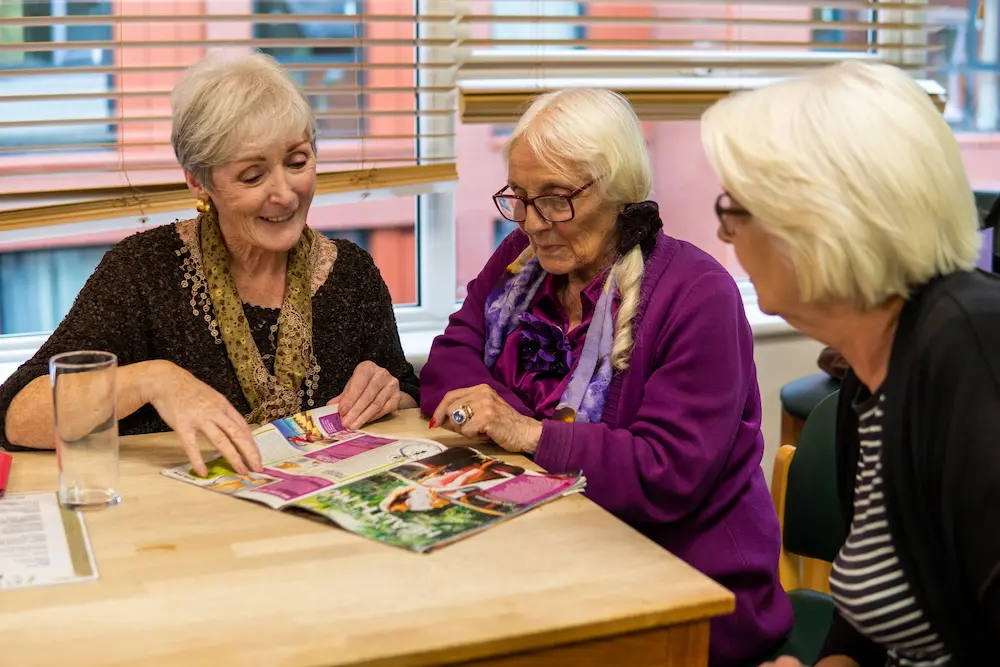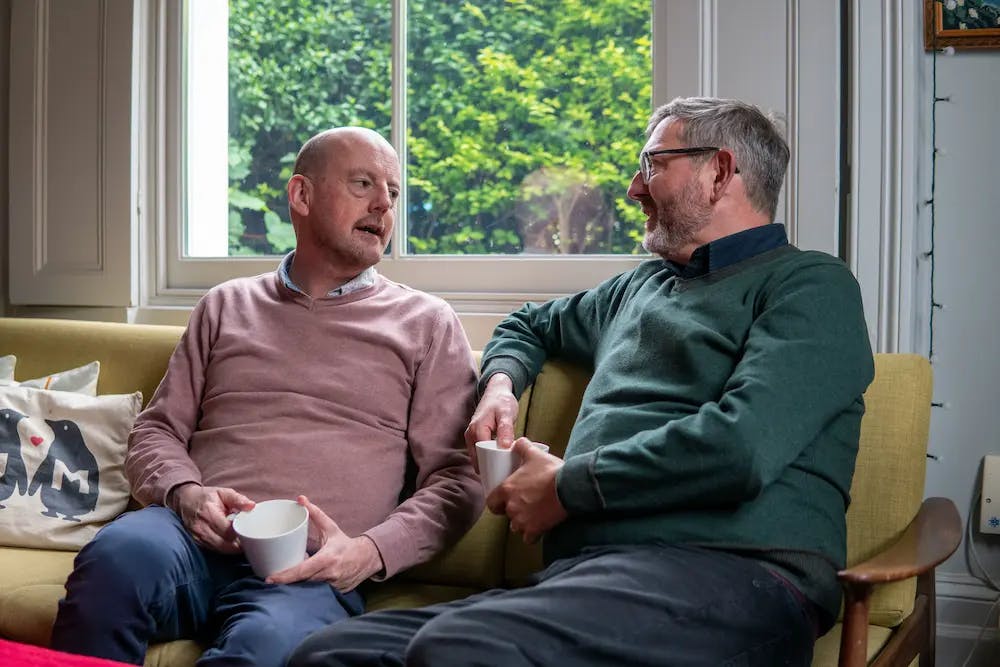Reminiscence Therapy For Dementia and Its Benefits

Estimated Reading Time: 8 minutes
For people with Alzheimer’s and other forms of dementia, personal identity can seem to lessen as memory, reasoning and attention slip away. Even as your loved ones become less aware of their surroundings and current events, they can still hold onto cherished memories.
Through reminiscence therapy, photographs, personal possessions with emotional connections and much-loved songs can all help stimulate fond thoughts of the past for individuals with dementia.
Keep reading to learn more about reminiscence therapy, including how it works and the benefits for your loved one or a friend.
Need to find dementia care fast?
Browse the best dementia care homes for your loved one.
In this article on reminiscence therapy:
- What is reminiscence therapy?
- How does reminiscence therapy work?
- Benefits of reminiscence therapy for people with dementia
- How effective is reminiscence therapy?
- What to do if reminiscence brings up difficult memories
What Is Reminiscence Therapy?
Reminiscence therapy is a treatment that involves all five senses - sight, touch, taste, smell and sound - to help people with dementia remember events, people and places from their past lives. A big part of reminiscence therapy involves carers using objects within activities to help individuals recall memories. These props could include videos, music, pictures or other personal possessions.
Other parts of reminiscence therapy can include simple activities like conversations, as well as more advanced clinical therapies such as sensory stimulation to help your loved ones become aware of memories that they once fondly held.
Reminiscence can take place with a wider dementia support group of family members and friends, or with just one or two close family members.
Experts say that storytelling about these past events can help people with dementia feel more connected to their present and other people, including their family and friends.
Many of our dementia care homes provide reminiscence therapy:
- Mountfitchet House Care Home in Stansted Mountfitchet has a reminiscence room
- Some areas at Mildenhall Lodge Care Home in Bury St Edmunds are themed for reminiscence
- Highmarket House Care Home in Banbury has a reminiscence café
These are just a few examples of the amazing reminiscence care a number of our homes offer to residents!

The difference between reminiscing and remembering
Reminiscing isn’t the same as asking someone to remember something from the past. Trying to remember something specific can be a stressful experience for someone with dementia, especially if they feel pressured or put on the spot.
On the other hand, when a pleasant memory makes its way to the forefront of your loved one's mind and they share it with you, it’ll feel good.
For example, your loved one may struggle to answer a simple question like “Where did you grow up” which could make them feel upset. Whereas if you’re looking through old photographs, they may have a sudden and fond memory of the house they used to live in and whereabouts it was.
Ideas such as reminiscence are often explored in a dementia village.
We’re here to help you find the right dementia care home for you or your loved one. You can request a free list of dementia care homes from our care experts, who will then share homes matching your budget and location. You can also search for a dementia care home through our easy-to-use directory.
How Does Reminiscence Therapy Work?
The ultimate aim of reminiscence therapy is to help people reconnect with their loved ones, despite any memory loss that’s occurred. Reminiscence therapy can be thought of as a form of dementia support.
Reminiscence therapy can also be beneficial for older adults who as they get older, feel more disconnected or lonely.
By stimulating the part of the brain in charge of long-term memory and cognition - much like in a memory care home - people who undergo this therapy are able to remember fond memories from years gone by and share these memories with loved ones.
How to start
When getting started with reminiscence therapy, you should begin with conversations about the past. Or, you can introduce a certain topic or an item to look at and handle if this is better. Engaging in conversation is a good place to start and will help your loved one feel they’re important and valued by you. This conversation will also make them feel a sense of belonging and affection.
Other possible reminiscence topics
- Childhood and holidays from earlier life
- Favourite playground games or board games to improve memory
- Foods, smells, likes and dislikes
- Pets and animals (including through pet therapy)
- Family, friends and other relationships
- School days
- Photographs and family albums
- Music, playlists and album covers
- Activities involving touch like painting, pottery or other crafts
- Other topics such as sports, cars, pop culture, beauty products and anything else you can think of!

Reminiscence dementia activities
Memories can be associated with different parts of the brain, so it’s helpful to try out activities that stimulate different senses. Some of these activities may be offered in a dementia care home.
Here are a few of the most effective reminiscence dementia activities:
1. Listening to their favourite music
Music for people with dementia helps people relate to emotions and past experiences. You can listen to your loved one’s favourite songs, have a sing-along or play music on simple instruments like bells, tambourines or a drum.
2. Look at photos and other meaningful items
Pictures or keepsakes that bring back memories are another excellent way to reminisce. Photos of family, friends and important life events are also wonderful choices, as well as photos of things that remind your loved one of their favourite hobbies.
3. Smell familiar scents and taste favourite foods
Smell is a brilliant way to access memories. You could create scent cards or jars using spices or essential oils to remind a person with dementia of their favourite foods and places. Similarly, making a meal that your loved one has loved over the years - such as a special dish for a holiday celebration - could help them recall the memories associated with it.
4. Enjoy activities relating to touch
Touch can also remind someone of the past, including activities like drawing, painting, pottery, knitting and sewing. Even if your loved one now finds it difficult to regularly take part in these hobbies, doing things like touching paintbrushes, swirling watercolours and playing with fabrics can evoke strong memories.
5. Memory boxes
These contain personal objects from the person with dementia’s past and can be used in several ways, such as; triggering positive memories, supporting wider family members and friends to stay connected through conversation prompts, providing insights into a person’s life story.

6. Life story work
This is important for carers and family members alike, as it allows you to show a genuine interest in what the person with dementia is saying. Through life story work, you can let the person know that you value their story. A life storybook can be decorated with photos or vibrant colours to help keep the person with dementia stimulated.
Benefits Of Reminiscence Therapy For People With Dementia
- Recalling and reminiscing about happy memories
- Improved feelings of confidence and an all-around better mood
- A greater understanding of what’s going on around your loved one
- You and your loved one will feel more connected to each other
- Reduced feelings of loneliness and isolation
- Less pressure on anybody providing dementia care
How Effective Is Reminiscence Therapy?
For reminiscence therapy to work properly, the therapist and the person with dementia need to both stay engaged. When this happens, reminiscence therapy has been shown to have multiple benefits, including better awareness and stronger bonds between the person receiving the therapy and their family, friends or caregivers.
Though research on reminiscence therapy is still in progress, this is clearly an effective form of therapy for people with Alzheimer’s and other forms of dementia.
With that being said, reminiscence therapy is just one approach that can help with memory. Though it can create a sense of belonging, it may also require your loved one to relive some unpleasant memories. With this in mind, it may be worth considering personal history before going ahead with this type of therapy.
If Reminiscence Brings Up Difficult Memories
You never know which memories will surface when reminiscing about the past. Sometimes, an unhappy memory will emerge.
So, it’s important to respond with kindness and understanding and ensure your loved one remains safe, calm, and at ease.
You’ll know your loved one best, so if something negative comes up, you’ll have a better idea of whether it’s best to listen and offer support or if you’re better off gently steering them towards a happier memory.
Lottie matches care seekers with the best dementia care homes for their needs. You can also request a free care home shortlist from our care experts, who will share homes matching your budget and location.




